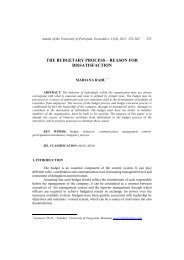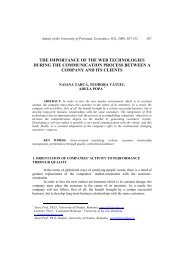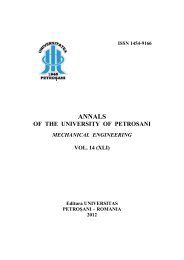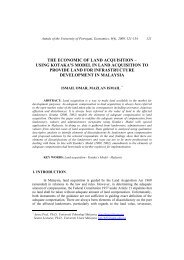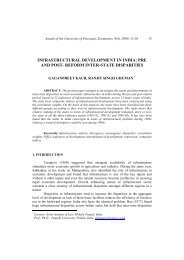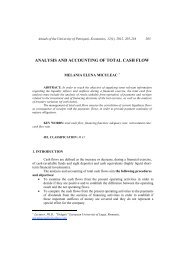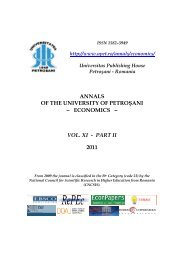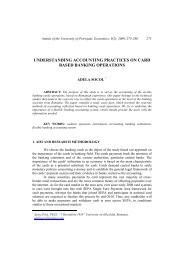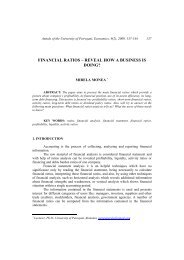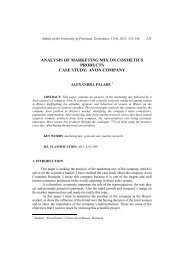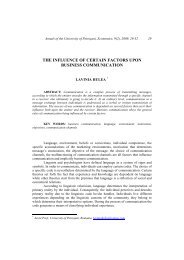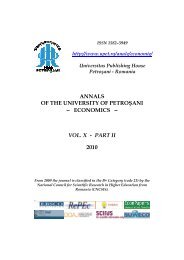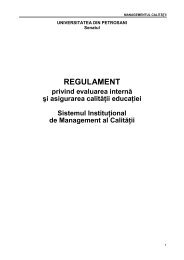- Page 1 and 2:
ISSN 1582-5949 http://www.upet.ro/a
- Page 3 and 4:
Annals of the University of Petroş
- Page 5 and 6:
Annals of the University of Petroş
- Page 7 and 8:
Concerns on Labour Power Selection
- Page 9 and 10:
Concerns on Labour Power Selection
- Page 11 and 12:
Concerns on Labour Power Selection
- Page 13 and 14:
Concerns on Labour Power Selection
- Page 15 and 16:
Concerns on Labour Power Selection
- Page 17 and 18:
Annals of the University of Petroş
- Page 19 and 20:
Regional Development - Past, Presen
- Page 21 and 22:
Regional Development - Past, Presen
- Page 23 and 24:
Regional Development - Past, Presen
- Page 25 and 26:
Regional Development - Past, Presen
- Page 27 and 28:
Regional Development - Past, Presen
- Page 29 and 30:
Regional Development - Past, Presen
- Page 31 and 32:
Regional Development - Past, Presen
- Page 33 and 34:
Annals of the University of Petroş
- Page 35 and 36:
Forms of Tax Evasion in Romania. An
- Page 37 and 38:
Forms of Tax Evasion in Romania. An
- Page 39 and 40:
Forms of Tax Evasion in Romania. An
- Page 41 and 42:
4. CONCLUSIONS Forms of Tax Evasion
- Page 43 and 44:
Annals of the University of Petroş
- Page 45 and 46:
Mitigation of the Crisis Effects in
- Page 47 and 48:
Mitigation of the Crisis Effects in
- Page 49 and 50:
Mitigation of the Crisis Effects in
- Page 51 and 52:
Annals of the University of Petroş
- Page 53 and 54:
Guiding Marks Regarding the Reasoni
- Page 55 and 56:
Guiding Marks Regarding the Reasoni
- Page 57 and 58:
Guiding Marks Regarding the Reasoni
- Page 59 and 60:
Annals of the University of Petroş
- Page 61 and 62:
The Influence of the Mining Unions
- Page 63 and 64:
The Influence of the Mining Unions
- Page 65 and 66:
The Influence of the Mining Unions
- Page 67 and 68:
The Influence of the Mining Unions
- Page 69 and 70:
The Influence of the Mining Unions
- Page 71 and 72:
Annals of the University of Petroş
- Page 73 and 74:
Integration process in management s
- Page 75 and 76:
Integration process in management s
- Page 77 and 78:
Annals of the University of Petroş
- Page 79 and 80:
The Use of Ranking Sampling Method
- Page 81 and 82:
where: ∧ ∧ 2 s = s = The Use of
- Page 83 and 84:
The Use of Ranking Sampling Method
- Page 85 and 86:
The Use of Ranking Sampling Method
- Page 87 and 88:
The Use of Ranking Sampling Method
- Page 89 and 90:
Annals of the University of Petroş
- Page 91 and 92:
ERP and BI Implementation in Romani
- Page 93 and 94:
ERP and BI Implementation in Romani
- Page 95 and 96:
ERP and BI Implementation in Romani
- Page 97 and 98:
Annals of the University of Petroş
- Page 99 and 100:
Romanian Companies Dilemmas-Busines
- Page 101 and 102:
Romanian Companies Dilemmas-Busines
- Page 103 and 104:
Romanian Companies Dilemmas-Busines
- Page 105 and 106:
Annals of the University of Petroş
- Page 107 and 108:
Proposal for Strategies to Build Mi
- Page 109 and 110:
Proposal for Strategies to Build Mi
- Page 111 and 112:
Proposal for Strategies to Build Mi
- Page 113 and 114:
Proposal for Strategies to Build Mi
- Page 115 and 116:
Annals of the University of Petroş
- Page 117 and 118:
Trust in B2B e-Marketplaces 117 of
- Page 119 and 120:
Trust in B2B e-Marketplaces 119 in
- Page 121 and 122:
Annals of the University of Petroş
- Page 123 and 124:
The Role of Accounting Information
- Page 125 and 126:
The Role of Accounting Information
- Page 127 and 128:
The Role of Accounting Information
- Page 129 and 130:
Annals of the University of Petroş
- Page 131 and 132:
Aspects Regarding the Evolution of
- Page 133 and 134:
Aspects Regarding the Evolution of
- Page 135 and 136:
Aspects Regarding the Evolution of
- Page 137 and 138:
Annals of the University of Petroş
- Page 139 and 140:
The Mining Projects - An Approach i
- Page 141 and 142:
The Mining Projects - An Approach i
- Page 143 and 144:
The Mining Projects - An Approach i
- Page 145 and 146:
Annals of the University of Petroş
- Page 147 and 148:
Promotion of Employment among Youth
- Page 149 and 150:
Promotion of Employment among Youth
- Page 151 and 152:
Annals of the University of Petroş
- Page 153 and 154: Decisions in Negotiations Using Exp
- Page 155 and 156: Decisions in Negotiations Using Exp
- Page 157 and 158: 3. CASE STUDY Decisions in Negotiat
- Page 159 and 160: Decisions in Negotiations Using Exp
- Page 161 and 162: Annals of the University of Petroş
- Page 163 and 164: The Impact of Micro Finance Institu
- Page 165 and 166: The Impact of Micro Finance Institu
- Page 167 and 168: The Impact of Micro Finance Institu
- Page 169 and 170: The Impact of Micro Finance Institu
- Page 171 and 172: Annals of the University of Petroş
- Page 173 and 174: Specific Aspects of the Technical R
- Page 175 and 176: Specific Aspects of the Technical R
- Page 177 and 178: Specific Aspects of the Technical R
- Page 179 and 180: Annals of the University of Petroş
- Page 181 and 182: Youngsters - Disadvantaged Group on
- Page 183 and 184: Youngsters - Disadvantaged Group on
- Page 185 and 186: Youngsters - Disadvantaged Group on
- Page 187 and 188: Annals of the University of Petroş
- Page 189 and 190: Internal Controls in Ensuring Good
- Page 191 and 192: Internal Controls in Ensuring Good
- Page 193 and 194: Internal Controls in Ensuring Good
- Page 195 and 196: Internal Controls in Ensuring Good
- Page 197 and 198: Annals of the University of Petroş
- Page 199 and 200: Social-Economic Aspects Regarding t
- Page 201 and 202: Social-Economic Aspects Regarding t
- Page 203: Social-Economic Aspects Regarding t
- Page 207 and 208: Annals of the University of Petroş
- Page 209 and 210: Human Capital and Higher Education
- Page 211 and 212: Human Capital and Higher Education
- Page 213 and 214: Human Capital and Higher Education
- Page 215 and 216: Annals of the University of Petroş
- Page 217 and 218: The Role of the Internal Audit in t
- Page 219 and 220: The Role of the Internal Audit in t
- Page 221 and 222: The Role of the Internal Audit in t
- Page 223 and 224: Annals of the University of Petroş
- Page 225 and 226: The Utility of the Barter Agreement
- Page 227 and 228: The Utility of the Barter Agreement
- Page 229 and 230: The Utility of the Barter Agreement
- Page 231 and 232: The Utility of the Barter Agreement
- Page 233 and 234: The Utility of the Barter Agreement
- Page 235 and 236: Annals of the University of Petroş
- Page 237 and 238: Restructuring and Reform in the Jiu
- Page 239 and 240: Restructuring and Reform in the Jiu
- Page 241 and 242: Restructuring and Reform in the Jiu
- Page 243 and 244: Restructuring and Reform in the Jiu
- Page 245 and 246: Annals of the University of Petroş
- Page 247 and 248: Sovereign Risk Assessment under Eco
- Page 249 and 250: Sovereign Risk Assessment under Eco
- Page 251 and 252: Sovereign Risk Assessment under Eco
- Page 253 and 254: Annals of the University of Petroş
- Page 255 and 256:
The Evolution of Marketing Methods
- Page 257 and 258:
The Evolution of Marketing Methods
- Page 259 and 260:
The Evolution of Marketing Methods
- Page 261 and 262:
Annals of the University of Petroş
- Page 263 and 264:
The Race to the Bottom and Its Impa
- Page 265 and 266:
The Race to the Bottom and Its Impa
- Page 267 and 268:
Annals of the University of Petroş
- Page 269 and 270:
Types of Decisions Based on Multi-C
- Page 271 and 272:
Types of Decisions Based on Multi-C
- Page 273 and 274:
Types of Decisions Based on Multi-C
- Page 275 and 276:
Types of Decisions Based on Multi-C
- Page 277 and 278:
Annals of the University of Petroş
- Page 279 and 280:
A Review of Financial Regulations t
- Page 281 and 282:
A Review of Financial Regulations t
- Page 283 and 284:
A Review of Financial Regulations t
- Page 285 and 286:
A Review of Financial Regulations t
- Page 287 and 288:
A Review of Financial Regulations t
- Page 289 and 290:
Annals of the University of Petroş



